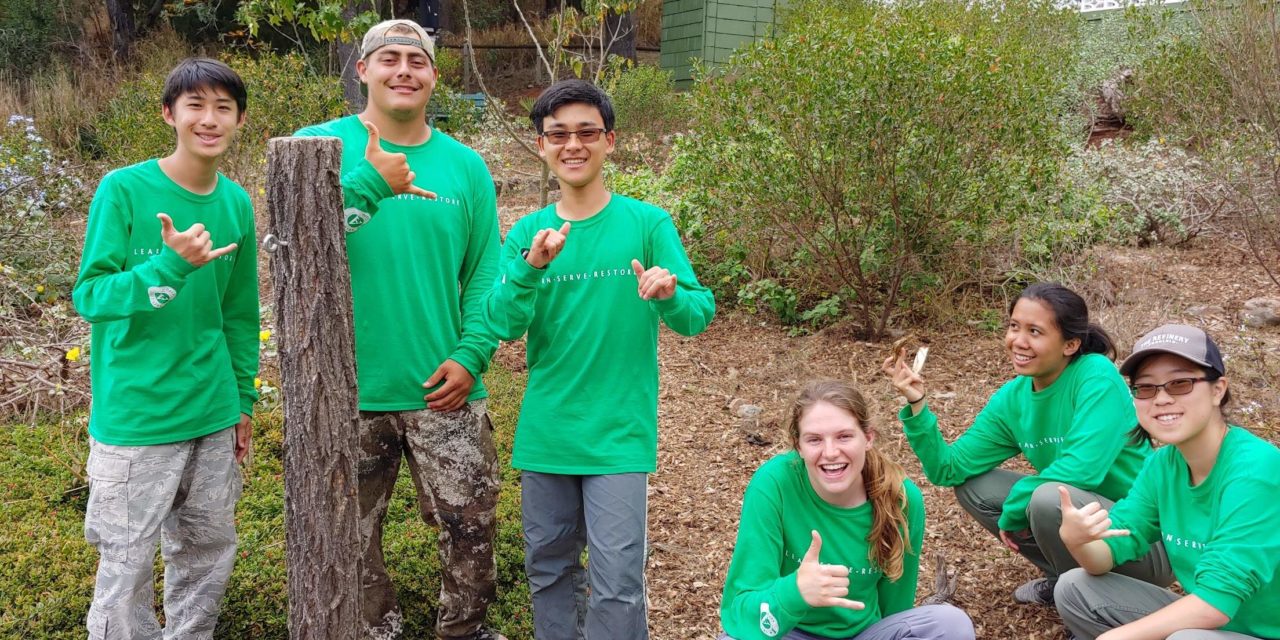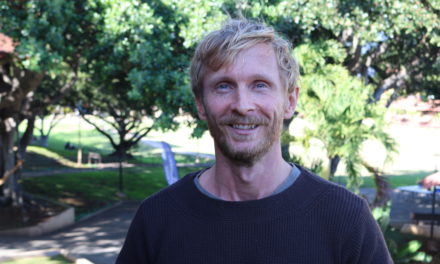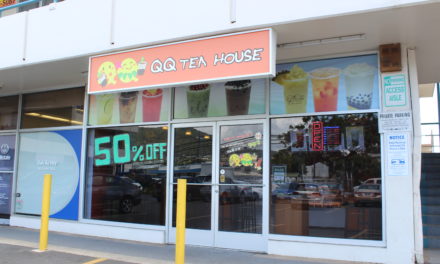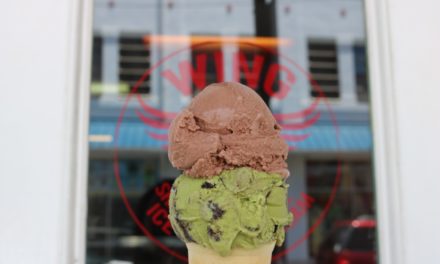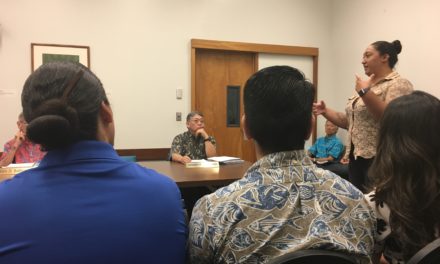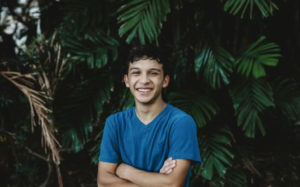By Kiana Dulan | Staff Writer
Spearfishing, scuba diving, and surfing waves was the usual routine for Dyson Chee, but after seeing the amounts of plastic polluting the ocean, the KapCC student found a passion for the environment and civic engagement. At the young age of 14, he met other youth who were already doing the inspiring work he wanted to engage in. Now 18-years-old, he has four years of organizing and advocacy experience under his belt, hoping to be a politician in the future.
Chee is the founder of Project OCEAN Hawaiʻi, the advocacy director for the Hawaiʻi Youth Climate Coalition, and a full-time youth activist beating plastic pollution. He was also a student volunteer for Kim Coco’s campaign.
“I want to have a future in Hawaiʻi,” Chee said. “I want to belong here, and I want people in my generation and future generations to feel like they belong here.”
As a homeschooled junior in Fall 2018, Chee launched Project OCEAN Hawaiʻi, which is his own initiative to combat plastic pollution. Before the pandemic, Chee’s team focused on single-use plastic straws, spoke at schools around the Hawaiian islands to spread the word about more environmentally friendly options, and assisted students in their own efforts to solve this problem.
Chee passed out metal straws to whoever he could and used them as a conversation starter when first working with his teammates from Kupu’s Hawaiʻi Youth Conservation Corps (HYCC) program in Summer 2019. For seven weeks, he and a team of five other youth spent time outdoors participating in restoration projects with a variety of organizations around Oʻahu. From this program, he said that spending all his time in the ʻāina and learning more about indigenous knowledge gave him a much better appreciation of the Hawaiian culture and the land he lives on.
Since 2016, Chee started taking dual credit classes as a freshman in high school and is now taking one class called Literature of Hawaiʻi, Oceania, and Asia taught by Porscha dela Fuente. He said his English class has also strengthened his Hawaiian values and advocacy work citing Hawaiʻi’s inherent inclusion and welcoming spirit of aloha.
“I think [Chee’s advocacy efforts] are really brave,” Fuente said. “And I think that’s not always easy to do whether you’re young, middle-aged, or old. It’s hard to get your voice out there, and I really appreciate that he’s willing to do that for students.”
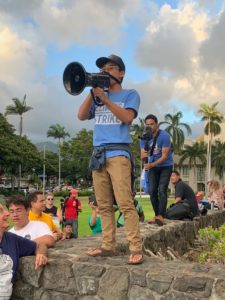
As advocacy director of the Hawai‘i Youth Climate Coalition, Dyson Chee led a climate strike at the capitol in Sep. 2019. (Photo courtesy of Dyson Chee)
Through his efforts, Chee spreads the spirit of aloha by getting legislation passed and encouraging the community to be civically engaged. He’s particularly passionate about climate change, youth rights, and the cost of living in Hawaiʻi. His courage has guided him as the advocacy director for the Hawaiʻi Youth Climate Coalition where he educates people about the need to shut down the AES coal plant, the revitalization of the city’s energy codes through Bill 25, and the importance of banning single-use plastics through Bill 40. Concerning more recent efforts, he’s currently leading his advocacy team to lower the voting age to 16 in Hawaiʻi and increasing support to pass Bill 2, a bill hoping to update Honolulu’s parking policies.
According to the University of Hawaiʻi Economic Research Organization (UHERO), Hawaiʻi’s population is decreasing and employment rates have decreased as well. Governing, a platform that highlights the question of “what state and local governments look like in a world of rapidly advancing technology” recently published an article by Andrew Gomes from the Honolulu Star-Advertiser, citing experts’ prediction of Hawaiʻi’s population decline as residents move to the mainland for more economic opportunities. Chee is well aware of these circumstances and said that these issues can make the local economy worse than it already is.
“If we’ve come to that level, then that’s a problem,” Chee said. “Covid has provided opportunities for people by forcing us to stay home, in a way, and by its demolition of the current systems. We’ve come to understand that tourism is unreliable, and at least in its current form, it didn’t work. It’s failed us.”
Covid may seem like the worst situation to happen among the plethora of problems arising in 2020, but Chee said that the people of Hawaiʻi must take advantage of this opportunity, take the losses and suffering now, and know that at least things will be better after the pandemic. With Hawai‘i branching away from tourism’s current form and creating more green and self-sustaining jobs such as Kupu’s new ʻĀina Corps program funded by the CARES Act, Chee said that this will hopefully incentivize people to stay in Hawaiʻi.
“Hawaiʻi is a complete failure when it comes to keeping youth here, providing us opportunity, and making us feel like we belong here… Part of the work I do is to change that,” Chee said. “Climate change is an intersectional issue. There are so many other issues that relate to climate change such as affordable housing, racism, cost of living, youth issues, and those all ultimately are contributing a piece to the current generation leaving the islands in search of a better future.”
He’s seen a hopeful trend in voter turnout with a total of 407,190 ballots statewide for the primary election in August 2020, according to the State Office of Elections. Hawaiʻi News Now attributed this number to mail-in voting, but he attributed this turnout to Covid having revealed a lot of issues, incentivizing people to “go beyond the grumbling.”
Other people may not even have time to care about the election because they are struggling to put food on the table. For those who are working three jobs, are struggling to get by, and feel like they don’t have enough time for politics, Chee said to ask themselves, “Why am I too busy to be involved in government?” Electing someone who thinks that earning a livable wage from one job can change a person’s situation, particularly if they continue to be civically engaged.
Chee views the ideal Hawaiʻi as just and equitable, where youth being engaged in government is more common, and where the people of Hawaiʻi choose more sustainable decisions with the future in mind, easily balancing “the benefit of the now” and “the benefit of the future.” Although he could have ran for office to be a Waikīkī Neighborhood Board Member this year, he said that he still wants to be a local politician in the future.
“I want to be a politician that’s not known for being a politician, but rather a community advocate,” Chee said. “I want to be someone who champions what the needs of the community are first and challenges the status quo. I want to uphold Hawaiian values like aloha, lōkahi, and pono, and I truly mean them in their Hawaiian values, not as their meager English translations.”

